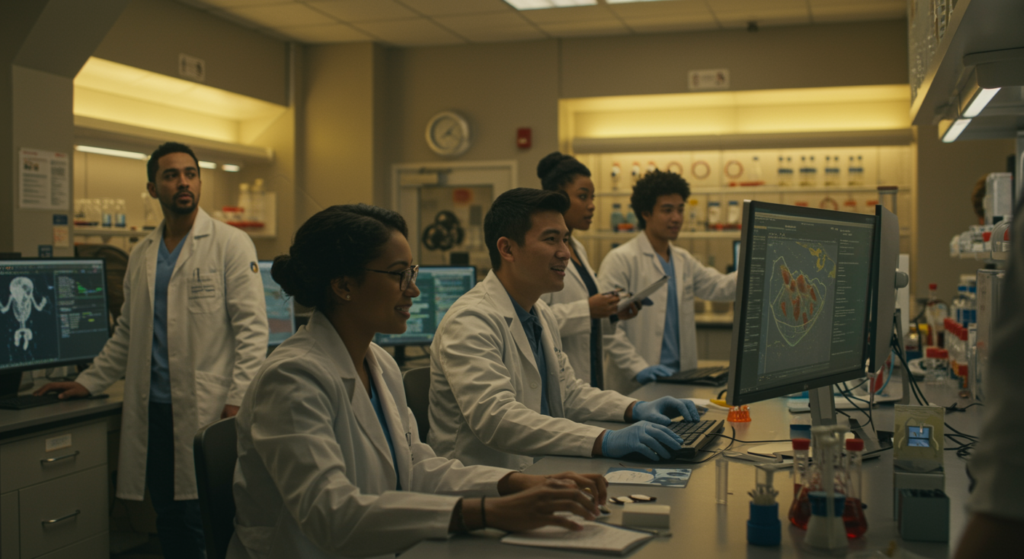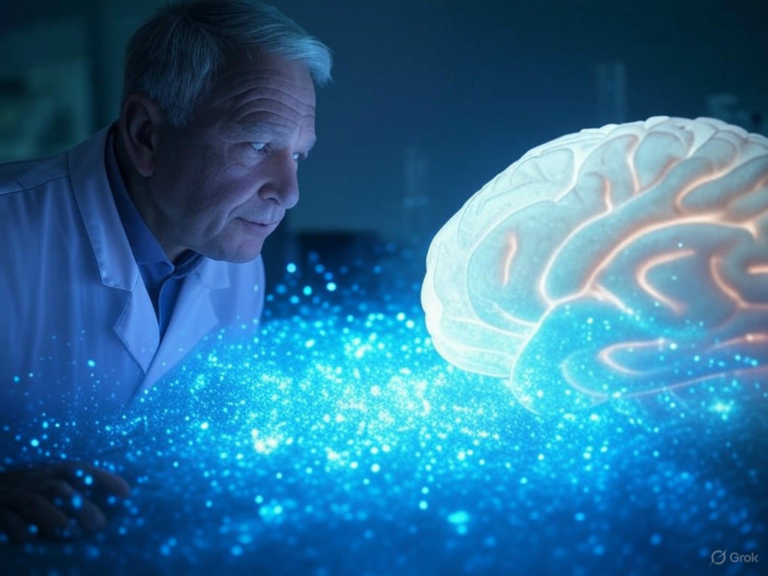
AI in Medicine: University of Pittsburgh Secures $10 Million Grant
Transforming Healthcare: A Major Investment in AI in Medicine
AI in medicine is taking a giant step forward with the University of Pittsburgh’s recent $10 million grant from Leidos, a tech powerhouse committed to innovation. This five-year partnership isn’t just about funding; it’s about accelerating the creation of AI-powered tools that could revolutionize how we detect diseases like heart conditions and cancer. Imagine doctors spotting issues faster, leading to quicker diagnoses and more effective care for patients across the nation—it’s an exciting shift that’s already gaining momentum.[1][4][5]
You might be wondering, what makes this grant so transformative? It’s all about leveraging AI in medicine to process vast amounts of data, cutting down wait times for results and enabling earlier interventions. This initiative could mean the difference between catching a problem early and facing more severe outcomes, highlighting why investments like this are crucial for modern healthcare.
The Power of the Pitt-Leidos Collaboration in Advancing AI in Medicine
This grant builds on a nearly 20-year partnership between the University of Pittsburgh and Leidos, which has already seen over $37 million invested in joint projects. Now, the spotlight is on Pitt’s Computational Pathology and AI Center of Excellence (CPACE), positioning it as a key player in AI in medicine through advanced digital pathology research. Have you ever considered how collaborations like this could bridge the gap between research and real-world applications?
- Enhancing digital pathology capabilities to handle complex tissue analysis more efficiently
- Speeding up the development of AI-powered diagnostics for better disease management
- Promoting innovative research in medical imaging that could change how we view patient data
- Ensuring equitable access to cutting-edge care, especially for underserved communities
By focusing on AI in medicine, this alliance isn’t just about technology—it’s about creating tools that make healthcare more accessible and precise for everyone.
AI’s Role in Modern Medicine
In today’s fast-paced world, AI in medicine is reshaping how healthcare professionals approach disease detection and treatment. These technologies go beyond human capabilities, analyzing data with incredible speed and accuracy to uncover patterns that might otherwise be missed. For instance, think about a scenario where AI quickly scans medical images to flag potential issues, allowing doctors to act swiftly and save lives.
Key Benefits of Integrating AI in Medicine
- Faster Disease Detection: AI algorithms can review tissue samples in minutes, dramatically reducing diagnostic delays and giving patients peace of mind sooner.
- Improved Diagnostic Accuracy: By drawing from massive datasets, AI in medicine minimizes errors, offering insights that enhance precision in complex cases like oncology.
- Broader Access to Care: What if rural areas had the same level of expertise as major cities? AI-driven solutions make this possible, bringing early detection to remote locations and promoting health equity.[1][4][7]
- Workforce Development: This grant includes programs to train the next wave of experts, ensuring a skilled workforce ready to tackle the challenges of AI in medicine.
These advancements show why AI in medicine is becoming the backbone of future healthcare systems, making routine checks more reliable and personalized.
Strategic Objectives and Research Directions in AI in Medicine
The CPACE-Leidos partnership has clear goals, all centered on pushing AI in medicine to new heights. They’re targeting the development of tools that deliver faster, more accurate diagnoses for complicated diseases, while also focusing on commercialization to sustain long-term growth. But how does this translate into everyday benefits? Let’s break it down.
- Creating AI technologies for rapid diagnosis, which could transform patient outcomes in areas like cardiology and oncology
- Turning research into marketable products that support both institutional progress and public health
- Launching educational initiatives, including internships and symposiums, to build a strong pipeline of talent in AI in medicine[1][5][7]
Areas of Focus for AI in Medicine Innovations
| Research Area | Impact |
|---|---|
| Digital Pathology | Establishes a new standard for diagnostics, allowing for scalable and precise analysis that speeds up results |
| AI Disease Detection | Enables earlier identification of conditions like cancer and heart disease, potentially improving survival rates |
| Medical Imaging | Refines imaging techniques to provide deeper insights, aiding in more informed treatment decisions |
| Workforce Development | Trains clinicians and researchers to effectively use AI in medicine, closing the skills gap in the industry |
Through these efforts, AI in medicine is set to drive meaningful change, making healthcare more efficient and responsive.
Expanding Access and Equity in Healthcare via AI in Medicine
A major priority of this grant is tackling healthcare disparities, using AI in medicine to deliver early and accurate disease detection to underserved populations. In rural areas, for example, where specialists are scarce, these tools could mean timely interventions that prevent escalation of conditions. It’s a step toward a more inclusive system, don’t you think?
Additionally, the partnership emphasizes support for military families and veterans, ensuring that advancements in AI in medicine reach those who’ve served. This focus on equity could inspire similar efforts nationwide, fostering a healthcare landscape where no one is left behind.[1][4][7]
Driving Innovation: New Products from AI in Medicine
Beyond research, this collaboration aims to commercialize AI in medicine technologies, with at least one product already in the intellectual property pipeline. This could lead to sustainable funding for ongoing innovations, turning ideas into practical solutions that benefit both providers and patients. For instance, imagine AI software that automates pathology workflows, easing the burden on labs and allowing for faster turnaround times.
Examples of Potential Products in AI in Medicine
- Advanced imaging software for early cancer screening, using AI to detect anomalies with high accuracy
- Predictive tools for cardiovascular risks, analyzing data from scans and records to forecast events
- Streamlined systems that optimize lab processes, reducing bottlenecks and improving overall efficiency
As these products emerge, AI in medicine will likely play a pivotal role in shaping the commercial side of healthcare, creating ripple effects for innovation.
Education and Workforce Development in AI in Medicine
One of the most promising aspects of this grant is its emphasis on education, offering students at Pitt hands-on opportunities through internships and mentorship with Leidos experts. These programs are designed to prepare the next generation for careers in AI in medicine, addressing the growing demand for skilled professionals. If you’re a student or aspiring expert, this could be your gateway to making a real impact.
By fostering symposiums and collaborative projects, the initiative ensures that knowledge in AI in medicine is shared widely, helping to build a workforce that’s equipped to handle future challenges. It’s not just about jobs—it’s about empowering people to drive positive change in healthcare.[1][5]
The Future of AI in Medicine: Pitt’s Vision
With this partnership, the University of Pittsburgh is envisioning a future where AI in medicine leads to groundbreaking improvements in patient care and research. The combination of academic expertise and technological prowess could influence healthcare on a global scale, from local clinics to international standards. Experts like Anantha Shekhar, Senior Vice Chancellor for the Health Sciences at Pitt, highlight the potential: “This isn’t going to only change how we think of pathology, but also the ability to collect this information longitudinally across millions of patients.”[1]
Leidos CEO Tom Bell adds, “Our investment is aimed at using the transformative power of artificial intelligence to speed detection, diagnosis and treatment of diseases that affect millions of people annually.”[4] So, what do you think—could AI in medicine be the key to unlocking healthier communities worldwide?
Conclusion
The $10 million grant from Leidos to the University of Pittsburgh marks a pivotal moment for AI in medicine, promising faster disease detection, enhanced access to care, and a well-trained workforce. As we look ahead, this collaboration exemplifies how innovation can address real-world needs, making healthcare more effective and equitable. Why not share your thoughts in the comments below, or explore our related resources to dive deeper?
- Dive into more on digital pathology at our Digital Pathology Innovation page.
- Check out workforce opportunities in AI in medicine via AI Healthcare Education.
- Learn about emerging trends in The Future of Medical Imaging.
Ready for more? We recommend this in-depth article from a trusted source: Leidos and University of Pittsburgh Invest $10M in AI for Disease Detection, which provides additional insights into the partnership.
References
- University of Pittsburgh School of Medicine. “$10 Million Investment from Leidos to Accelerate AI Tools in Health Care.” Link
- University Times. “Leidos Invests $10 Million.” Link
- Pittsburgh Post-Gazette. “University of Pittsburgh Research Grant.” Link
- MobiHealthNews. “Leidos, University of Pittsburgh to Spend $10M on AI Disease Detection.” Link
- PennBizReport. “Virginia Company, University of Pittsburgh Investing $10M in AI Tools.” Link
- GovTech. “University of Pittsburgh Gets $10M to Study AI for Medical Diagnoses.” Link
- CBS News Pittsburgh. “Leidos, University of Pittsburgh Partnership for AI in Medicine.” Link
Suggested Images:
- Photo of Pitt’s CPACE research team in a digital pathology lab (alt: “University of Pittsburgh AI in medicine research team at CPACE”)
- Infographic showing the workflow of AI-powered disease detection from sample collection to diagnosis (alt: “AI disease detection process at University of Pittsburgh”)
AI in medicine, University of Pittsburgh, $10 million grant, Leidos partnership, AI disease detection, Computational Pathology, AI-powered tools, digital pathology, healthcare innovation, medical AI







